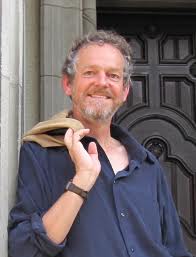I’m very pleased to introduce Philip Clayton, an associate of mine who will be offering some guest blogs on some topics interest we have in common: PostChristian culture, postmodern theology, and the trajectory of faith in the 21st century.
Philip Clayton is the Ingraham Professor of Theology at Claremont School of Theology. Clayton earned a joint PhD in Religious Studies and Philosophy from Yale University and has held visiting appointments at Harvard University, the University of Cambridge, and the University of Munich. He has published over 20 books and hundreds of academic and popular articles.
For this first piece, Phillip writes about the CANA Initiative, for which I did an interview with Brian McLaren, Stephanie Spellers and Doug Pagitt. He’ll be attending the first event for CANA next week, so he shares his thoughts on why it needs not only to exist, but to succeed.
Welcome Philip!
***
A New Network of Networks
 “The CANA Initiative is a collective of faith-engaged organizations, individuals, institutions and networks rooted in a generous Christian tradition, who seek to embody a new Christian ethos leading to constructive collective action in the United States” (http://www.canainitiative.org/)
“The CANA Initiative is a collective of faith-engaged organizations, individuals, institutions and networks rooted in a generous Christian tradition, who seek to embody a new Christian ethos leading to constructive collective action in the United States” (http://www.canainitiative.org/)
Next week movement leaders from across the United States will be meeting at the National Cathedral to found a new nation-wide collaboration. When we were first brainstorming how to launch the CANA Initiative, we considered asking movement leaders from around the country to each submit a blog on why they think CANA is important. Here’s my case for why this month’s National Cathedral meeting is crucially important to the future of the church in America:
When does decline become free fall?
All agree the institutional church is struggling. What if things really are as they appear, and it’s not about to make a comeback? What if as a culture we’re already transitioning to a new paradigm? It’s time to let the guilt go and embrace the future of faith.
The challenge is clear: it’s difficult to lead in a forward direction when our eyes (and many of our practices) are so thoroughly locked in the past.
Recently, a top church administrator was describing to me the precipitous decline in his denomination. All efforts, he said, are geared toward stemming the loss of members and money. His rhetorical question continues to echo in my mind: “But what if God is in the decline?”
There’s deep wisdom there. If animal populations don’t die, new species can’t arise. If older workers don’t retire, college grads can’t get jobs. If you don’t stop buying CDs, you won’t be able to build up your collection of streamable music on the cloud.
This isn’t just a law of nature; it’s a principle of the spiritual life as well. If you don’t move beyond the insights of past eras, you won’t be part of tomorrow’s answers. Remember: today’s problems were yesterday’s solutions.
For almost 350 years, the traditional church sanctuary, with its tall white tower and straight rows of wooden pews, stood at the center of European and American Christianity. What noble hymns and inspired preaching these buildings contained, what bulwarks they provided for the values and mores of Western Christendom! The churches supplied visible and spiritual support for the social order, for Christian marriages, for patriotism and American foreign policy. They taught good ethics for young people. They were networking sites for businessmen, politicians, and ordinary folk alike. Much good was served by the traditional congregational and denominational system … for centuries.
To everything there is a season. All good things serve their purpose, begin to diminish, and eventually pass on into the pages of history books. You don’t have to be gleeful about this transition. Good or bad, it’s simply true that many Christian institutions from the past are now moving from mainstream to the periphery. Jesus’ kerygma, his call to radical compassion, and the life together that he called “the kingdom of God” are not outmoded, even if some of its particular manifestations are.
New Atheists and other gleeful advocates of the death of God and the death of faith are wrong about the facts. Younger Americans are not less spiritual than their church-attending grandparents; they just express their faith differently. Today, instead of going to record stores to buy music, we shop online. We connect naturally by texting, facebooking, and other social media — so naturally that the technology becomes almost invisible to us.
It’s no surprise that these changes affect how we do spiritual community. In a 24/7 culture, fewer people find that the Sunday morning worship service stands at the center of their spiritual practice. Seeking God, emulating Jesus, seeking transformative Christian community — these things matter just as much to many of us as they did to our parents. It’s just that we practice them in different ways.
Leave the old battles behind!
Meera Nanda writes about India, but her title, Prophets Facing Backwards, offers a clear warning to the Christian church as well. Being a leader and speaking prophetically requires a clear mind, the skills of a cultural creative, and above all eyes that are focused forward not backward. All around us, people are living their way into an amazing variety of new theologies, new forms of practice, new types of religious community. How can one speak prophetically about the future of the church without living in this world?
It’s time to side with the innovators. It’s time to become students of the new innovations: the players, the emerging networks, the emerging theologies, the hopeful signs and the hypocrisies … the acts of courage and the failures of nerve.
Most of us have long since ceased defining ourselves by the –isms of ancient theological debates. We’re no less committed to the ideal of “faith seeking understanding”; it’s just that we need the freedom to do it in our own terms. That means “Just Say No” to our parents’ dichotomies, such as a Christianity defined in terms of the “evangelical” vs. “progressive” divide. We say an equally strong “No!” to dogmatism and intolerance — indeed, to a host of old either/or debates.
In short….
… a new wind is blowing, and a new movement of faith is growing. It’s time to give up the nostalgia for the fading forms of American Christianity. Jesus’ path of compassion is more incomprehensible, and more attractive, than in the Age of Belief. It’s time to cast off the comfortable forms of the past and to embrace a faith in and of the Unknown.
That’s what’s happening at the National Cathedral next week.












